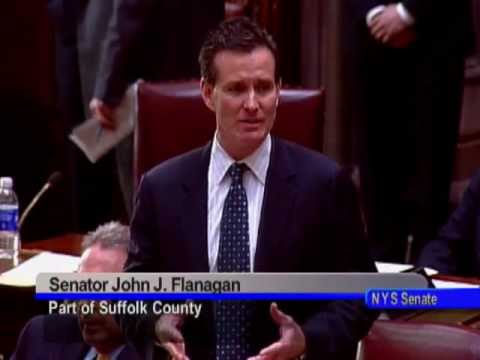
Senate Passes Legislation To Protect Senior Citizens From Abuse And Exploitation
John J. Flanagan
June 19, 2015
-
ISSUE:
- Aging

Senate Majority Leader John Flanagan (2nd Senate District) announced that the New York State Senate has passed a sweeping package of 10 bills to protect vulnerable senior citizens from predatory financial schemes and physical and emotional abuse. The legislation would create a statewide elder abuse reporting system and increase public awareness of elder mistreatment, facilitate the prosecution of individuals who endanger the welfare of seniors, and help ensure adequate care for the elderly in long-term care facilities.
“Senior citizens are the fastest growing demographic in the nation today. Here in New York, it is vital that we do all we can to protect them from neglect and abuse and ensure that they receive the best, most appropriate care. With these bipartisan measures, we take the next step forward in addressing the concerns of seniors and their families across the state,” stated Majority Leader Flanagan.
By 2050, people age 65 years or older are projected to comprise 20 percent of the United States’ population. Data from Adult Protective Services agencies indicate a national increase in reports of elder abuse. However, a New York State study on the prevalence of elder abuse found that for every case known to programs and agencies, 24 were unreported. The legislation passed today would:
Expand Protections Against Elder Abuse
A national study found that approximately 90 percent of elder abusers were family members, most often adult children, spouses, and partners. This maltreatment takes many forms, ranging from physical and psychological abuse to financial exploitation. The legislation contains legislation to protect victims of elder abuse:
- S5905: would broaden the focus of the New York State Committee for the Coordination of Police Services to Elderly Persons. This legislation would authorize the committee to examine approaches to improving the quality of life for seniors in addition to further protect elderly citizens from physical, emotional, and financial abuse.
- S639: authorizes banks to refuse to carry out a monetary transaction if there is reason to believe that it involves the financial exploitation of an elderly adult or vulnerable adult who is 18 or older. It also enables the banking institution to provide relevant records to law enforcement and social service officials investigating these crimes.
- S641: would expand the definition of a caregiver in the penal law in order to protect seniors from individuals who endanger their welfare to include those who are unpaid such as a volunteer caregiver, appointed guardian, or power of attorney. This would eliminate a crucial barrier to the prosecution of elder abuse.
Monitor and Increase Public Awareness of Elderly Mistreatment
- S852: would help better identify and prevent incidences of elder abuse throughout New York State by requiring the state Office of Children and Family Services, along with the state Office for the Aging, to collect and analyze data on the mistreatment and neglect of seniors from state and local agencies, create an interagency elder abuse reporting system and produce a report with recommendations to prevent these offenses from occurring.
- S5328A: would increase awareness of the financial exploitation and neglect of senior citizens statewide by authorizing the state Office for the Aging to conduct a public relations campaign on preventing elder abuse.
Change the Courts to Protect Seniors
New York is one of five states that account for more than one-third of all elder abuse cases in the nation. The Senate passed legislation to help ensure the successful prosecution of individuals who abuse or exploit senior citizens.
- S394: would allow recorded testimony from certain elderly witnesses to be used as evidence at a later date in a criminal proceeding.
- S624: would better protect mentally impaired victims from financial exploitation by allowing prosecutors to obtain patient medical records with a subpoena upon showing that the patient suffers from a mental disability and that the patient has been the victim of a crime.
Two bills passed would also clarify the authority of adult guardians of senior citizens. Recently, there have been high-profile cases in which adult children from a previous marriage have been denied the right to visit their incapacitated elderly parent by the current spouse. In two situations in California involving the late Peter Falk and the late Casey Casem, the respective spouses cut off the adult children from their fathers, failed to notify the children of major changes in their fathers’ medical conditions and excluded them from funeral arrangements after their fathers’ deaths. Current New York State law does not provide an avenue for children in these situations to petition the courts for reasonable visitation rights.
- S5154A: “Peter Falk’s Law” would safeguard vulnerable adults from being isolated from their family and friends. This bill would require guardians to notify adult children and other close relatives if the elderly individual enters the hospital, if he or she dies, and of burial and funeral information. Adult children would also be able to petition the court for visitation rights if the parent is unreasonably isolated from his or her relatives.
- S5482 would improve the ability of out-of-state guardians to best represent the interests of an elderly person, and further simplify the process for determining jurisdiction among multiple states in adult guardianship cases
Protect Seniors in Long-term Care Facilities
S5702: would extend the authorization of the Long Term Care Ombudsman Program (LTCOP), an important advocate for seniors in long-term care facilities such as nursing homes, assisted living facilities and adult homes. Currently, the LTCOP is authorized to oversee managed long-term care plans, but these provisions are set to expire on December 31, 2015.
The bills have been sent to the Assembly, except S5482, S5905, S5702 and S5328A which have now passed both the Senate and the Assembly and will be sent to the Governor for review.
Share this Article or Press Release
Newsroom
Go to Newsroom
